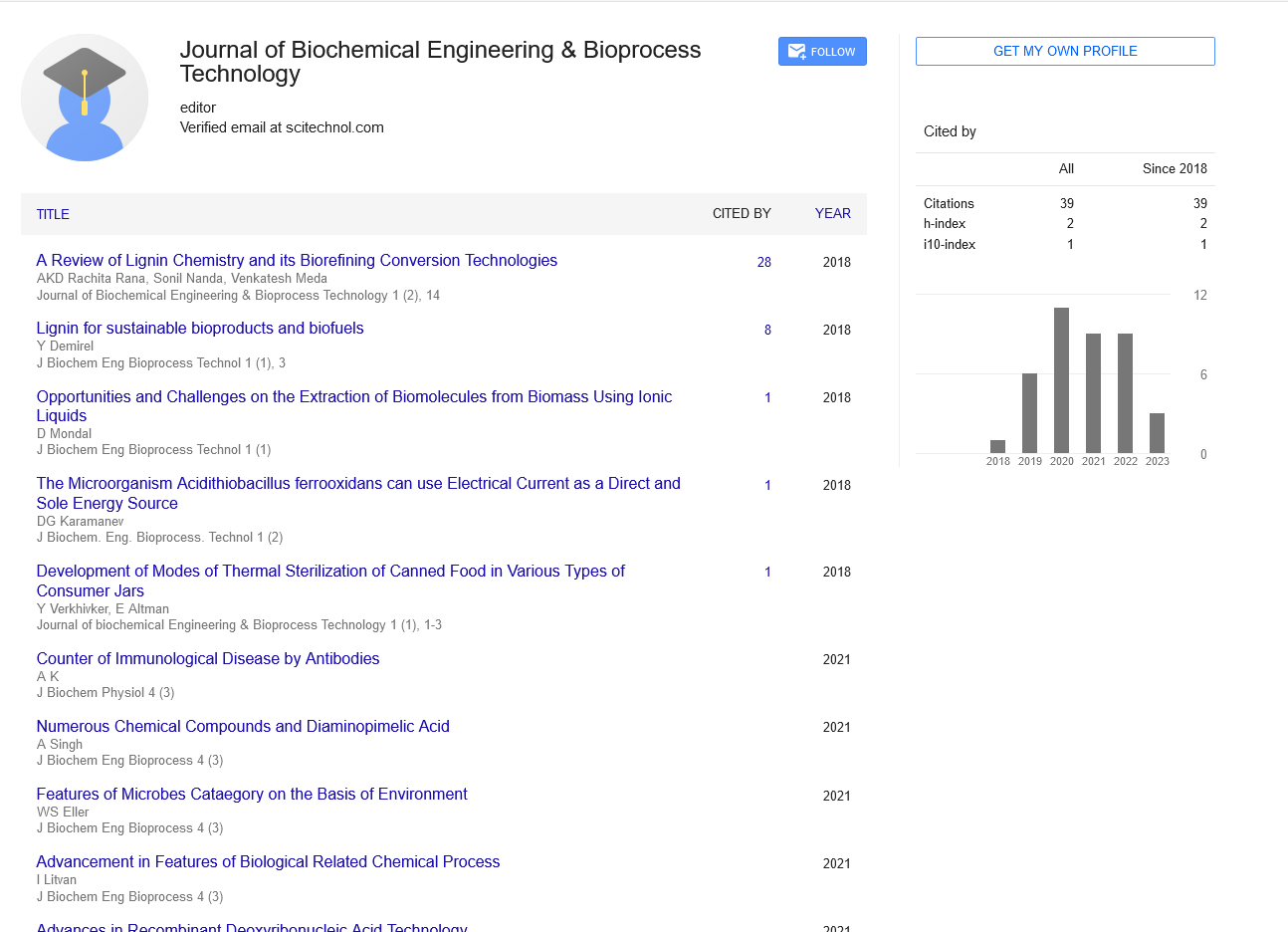Commentary, J Biochem Eng Bioprocess Vol: 4 Issue: 4
Exhausting of Oil Well in the Earth
K Srinivasen Ayer*
Department of Biotechnology, Ramaiah Institute of Technology Benguluru, India
*Corresponding author: Ayer KS, Ramaiah Institute of Technology, Bengaluru, Email: srinivasenkayer@gmail.com
Received date: July 1, 2021; Accepted date: July 16, 2021; Published date: July 22, 2021
Abstract
An oil well is an exhausting in the Earth that is intended to bring petrol oil hydrocarbons to the surface. Typically some flammable gas is delivered as related petrol gas alongside the oil. A well that is intended to deliver just gas might be named a gas well. Wells are made by penetrating down into an oil or gas hold that is then mounted with an extraction gadget, for example, a pump jack which permits extraction from the save.
Keywords: Deoxyribonucleic
Introduction
An oil well is an exhausting in the Earth that is intended to bring petrol oil hydrocarbons to the surface. Typically some flammable gas is delivered as related petrol gas alongside the oil. A well that is intended to deliver just gas might be named a gas well. Wells are made by penetrating down into an oil or gas hold that is then mounted with an extraction gadget, for example, a pump jack which permits extraction from the save. Making the wells can be a costly interaction, costing no less than a huge number of dollars, and costing substantially more when in difficult to arrive at regions, for example while making seaward oil stages. The interaction of current penetrating for wells initially began in the nineteenth century, however was made more proficient with advances to oil boring apparatuses during the twentieth century. Wells are every now and again sold or traded between various oil and gas organizations as a resource – in enormous part in light of the fact that during falls in cost of oil and gas, a well might be inefficient, however on the off chance that costs rise, even low creation wells might be monetarily important. Additionally new techniques, for example, water powered cracking (a cycle of infusing gas or fluid to constrain more oil or gaseous petrol creation) have made a few wells practical. Nonetheless, top oil and environment strategy to petroleum products has made less and less of these wells and costly strategies reasonable. Nonetheless, the enormous number of disregarded or inadequately kept up with wellheads is a huge ecological issue: they may spill methane emanations or other poisonous outflows into nearby air, water or soil frameworks. This contamination regularly turns out to be more terrible when wells are deserted or stranded – where wells never again are monetarily suitable, and never again are kept up with by an organization. A 2020 gauge by Reuters proposed that there were something like 29 million deserted wells universally, making a huge wellspring of ozone harming substance outflows causing environmental change.
The soonest realized oil wells were bored in China in 347 CE. These wells had profundities of up to around 240 meters (790 ft) and were bored utilizing pieces joined to bamboo poles. The oil was scorched to dissipate saline solution and produce salt. By the tenth century, broad bamboo pipelines associated oil wells with salt springs. The old records of China and Japan are said to contain numerous inferences to the utilization of gaseous petrol for lighting and warming. Oil was known as consuming water in Japan in the seventh century. As per Kasem Ajram, oil was refined by the Persian chemist Muhammad in the ninth century, delivering synthetic substances like lamp fuel in the alembic (al-ambiq) and which was mostly utilized for lamp oil lights. Bedouin and Persian scientific experts likewise refined raw petroleum to deliver combustible items for military purposes. Through Islamic Spain, refining opened up in Western Europe by the twelfth century. A few sources guarantee that from the ninth century, oil fields were abused nearby around present day Baku, Azerbaijan, to deliver naphtha for the petrol business. These spots were depicted by Marco Polo in the thirteenth century, who portrayed the yield of those oil wells as many shiploads. At the point when Marco Polo in 1264 visited Baku, on the shores of the Caspian Sea, he saw oil being gathered from leaks. He composed that "on the limits toward Geirgine there is a wellspring from which oil springs in incredible bounty, in however much 100 shiploads may be taken from it at one time. The objective (the end point of the well) will be coordinated with a surface area (the beginning stage of the well), and a direction between the two will be planned. There are numerous contemplations to consider when planning the direction like the leeway to any close by wells (hostile to impact) or on the other hand if this well will impede future wells, attempting to stay away from deficiencies if conceivable and certain developments might be simpler/more hard to penetrate at specific tendencies or azimuths. At the point when the well way is recognized, a group of geoscientists and specialists will foster a bunch of assumed properties of the subsurface that will be penetrated through to arrive at the objective. These properties incorporate pore pressure, break inclination, wellbore solidness, porosity, penetrability, lithology, deficiencies, and dirt substance. This series of expectations is utilized by a well designing group to play out the packaging plan and consummation plan for the well, and afterward definite arranging, where, for instance, the boring tools are chosen, a BHA is planned, the penetrating liquid is chosen, and bit by bit methods are composed to give guidance to executing the well in a safe and cost-effective way.
 Spanish
Spanish  Chinese
Chinese  Russian
Russian  German
German  French
French  Japanese
Japanese  Portuguese
Portuguese  Hindi
Hindi 